Business Law Report: English Legal System for New Businesses
VerifiedAdded on 2023/01/13
|12
|3303
|69
Report
AI Summary
This report provides a comprehensive overview of the English legal system, tailored for new business organizations. It begins by exploring the various sources of UK law, including case law (common law and equity), legislation, EU law, international conventions and treaties, and the role of legal authorities and writers. The report then delves into the role of the UK government, analyzing the functions of the monarchy, the executive, the legislature, and the judiciary within the legal framework. A significant portion is dedicated to the law-making process, detailing the stages from the decision to legislate, bill preparation, introduction, parliamentary stages and royal assent. Finally, the report examines the application of statute and common law in UK justice courts. This assignment is designed to provide essential knowledge for businesses operating within the UK, offering a clear understanding of the legal landscape.

Business Law
Paraphrase This Document
Need a fresh take? Get an instant paraphrase of this document with our AI Paraphraser
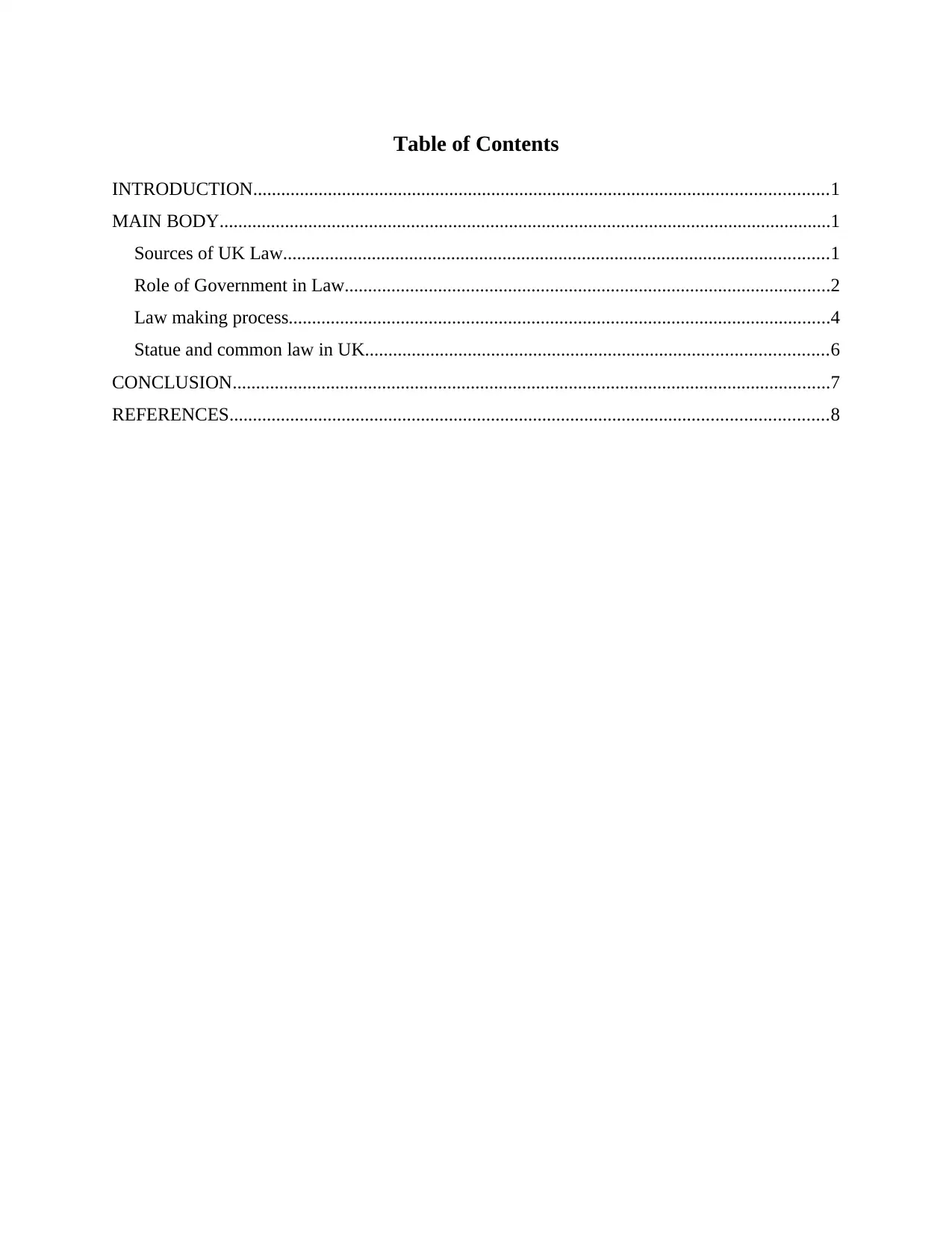
Table of Contents
INTRODUCTION...........................................................................................................................1
MAIN BODY...................................................................................................................................1
Sources of UK Law.....................................................................................................................1
Role of Government in Law........................................................................................................2
Law making process....................................................................................................................4
Statue and common law in UK...................................................................................................6
CONCLUSION................................................................................................................................7
REFERENCES................................................................................................................................8
INTRODUCTION...........................................................................................................................1
MAIN BODY...................................................................................................................................1
Sources of UK Law.....................................................................................................................1
Role of Government in Law........................................................................................................2
Law making process....................................................................................................................4
Statue and common law in UK...................................................................................................6
CONCLUSION................................................................................................................................7
REFERENCES................................................................................................................................8

⊘ This is a preview!⊘
Do you want full access?
Subscribe today to unlock all pages.

Trusted by 1+ million students worldwide
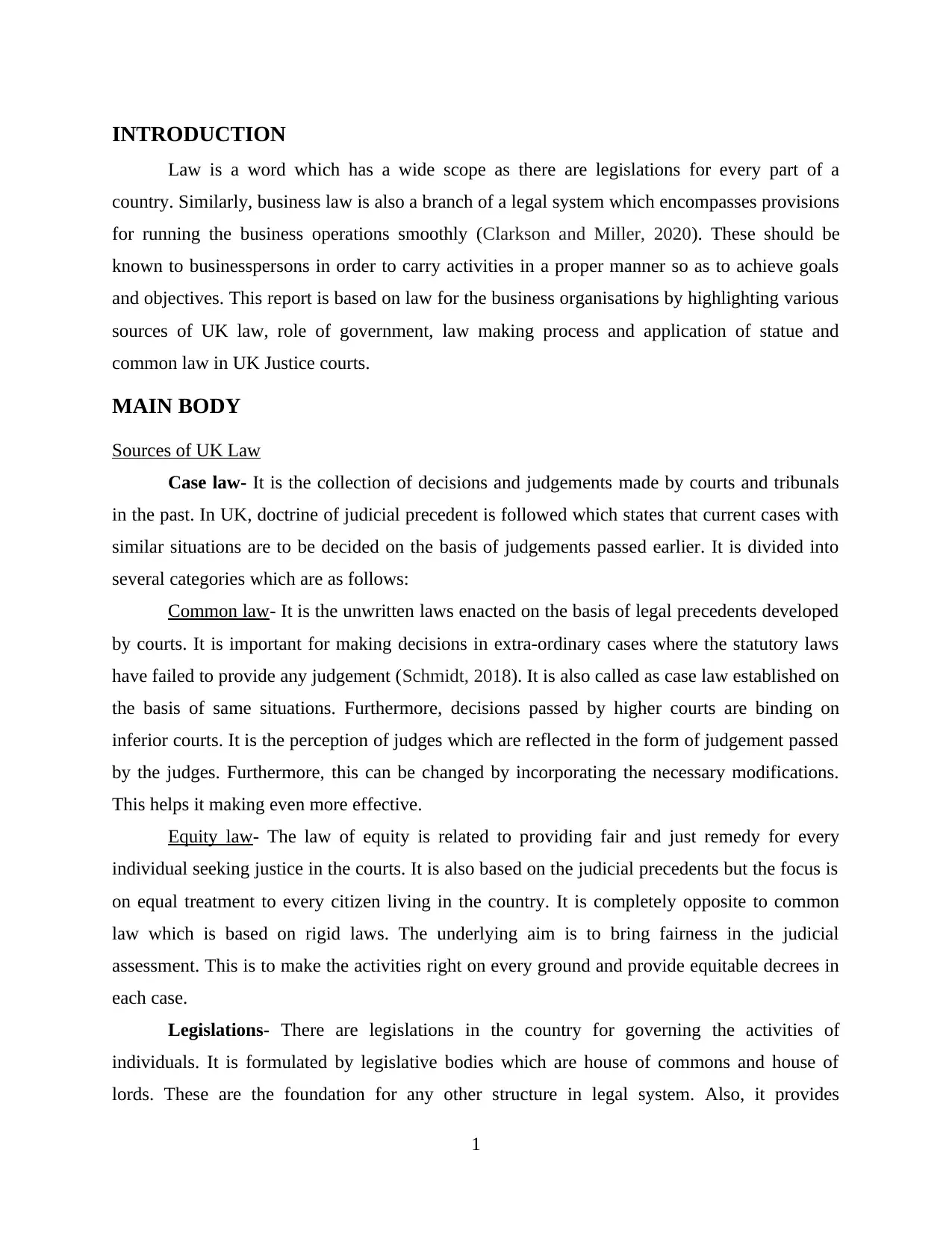
INTRODUCTION
Law is a word which has a wide scope as there are legislations for every part of a
country. Similarly, business law is also a branch of a legal system which encompasses provisions
for running the business operations smoothly (Clarkson and Miller, 2020). These should be
known to businesspersons in order to carry activities in a proper manner so as to achieve goals
and objectives. This report is based on law for the business organisations by highlighting various
sources of UK law, role of government, law making process and application of statue and
common law in UK Justice courts.
MAIN BODY
Sources of UK Law
Case law- It is the collection of decisions and judgements made by courts and tribunals
in the past. In UK, doctrine of judicial precedent is followed which states that current cases with
similar situations are to be decided on the basis of judgements passed earlier. It is divided into
several categories which are as follows:
Common law- It is the unwritten laws enacted on the basis of legal precedents developed
by courts. It is important for making decisions in extra-ordinary cases where the statutory laws
have failed to provide any judgement (Schmidt, 2018). It is also called as case law established on
the basis of same situations. Furthermore, decisions passed by higher courts are binding on
inferior courts. It is the perception of judges which are reflected in the form of judgement passed
by the judges. Furthermore, this can be changed by incorporating the necessary modifications.
This helps it making even more effective.
Equity law- The law of equity is related to providing fair and just remedy for every
individual seeking justice in the courts. It is also based on the judicial precedents but the focus is
on equal treatment to every citizen living in the country. It is completely opposite to common
law which is based on rigid laws. The underlying aim is to bring fairness in the judicial
assessment. This is to make the activities right on every ground and provide equitable decrees in
each case.
Legislations- There are legislations in the country for governing the activities of
individuals. It is formulated by legislative bodies which are house of commons and house of
lords. These are the foundation for any other structure in legal system. Also, it provides
1
Law is a word which has a wide scope as there are legislations for every part of a
country. Similarly, business law is also a branch of a legal system which encompasses provisions
for running the business operations smoothly (Clarkson and Miller, 2020). These should be
known to businesspersons in order to carry activities in a proper manner so as to achieve goals
and objectives. This report is based on law for the business organisations by highlighting various
sources of UK law, role of government, law making process and application of statue and
common law in UK Justice courts.
MAIN BODY
Sources of UK Law
Case law- It is the collection of decisions and judgements made by courts and tribunals
in the past. In UK, doctrine of judicial precedent is followed which states that current cases with
similar situations are to be decided on the basis of judgements passed earlier. It is divided into
several categories which are as follows:
Common law- It is the unwritten laws enacted on the basis of legal precedents developed
by courts. It is important for making decisions in extra-ordinary cases where the statutory laws
have failed to provide any judgement (Schmidt, 2018). It is also called as case law established on
the basis of same situations. Furthermore, decisions passed by higher courts are binding on
inferior courts. It is the perception of judges which are reflected in the form of judgement passed
by the judges. Furthermore, this can be changed by incorporating the necessary modifications.
This helps it making even more effective.
Equity law- The law of equity is related to providing fair and just remedy for every
individual seeking justice in the courts. It is also based on the judicial precedents but the focus is
on equal treatment to every citizen living in the country. It is completely opposite to common
law which is based on rigid laws. The underlying aim is to bring fairness in the judicial
assessment. This is to make the activities right on every ground and provide equitable decrees in
each case.
Legislations- There are legislations in the country for governing the activities of
individuals. It is formulated by legislative bodies which are house of commons and house of
lords. These are the foundation for any other structure in legal system. Also, it provides
1
Paraphrase This Document
Need a fresh take? Get an instant paraphrase of this document with our AI Paraphraser
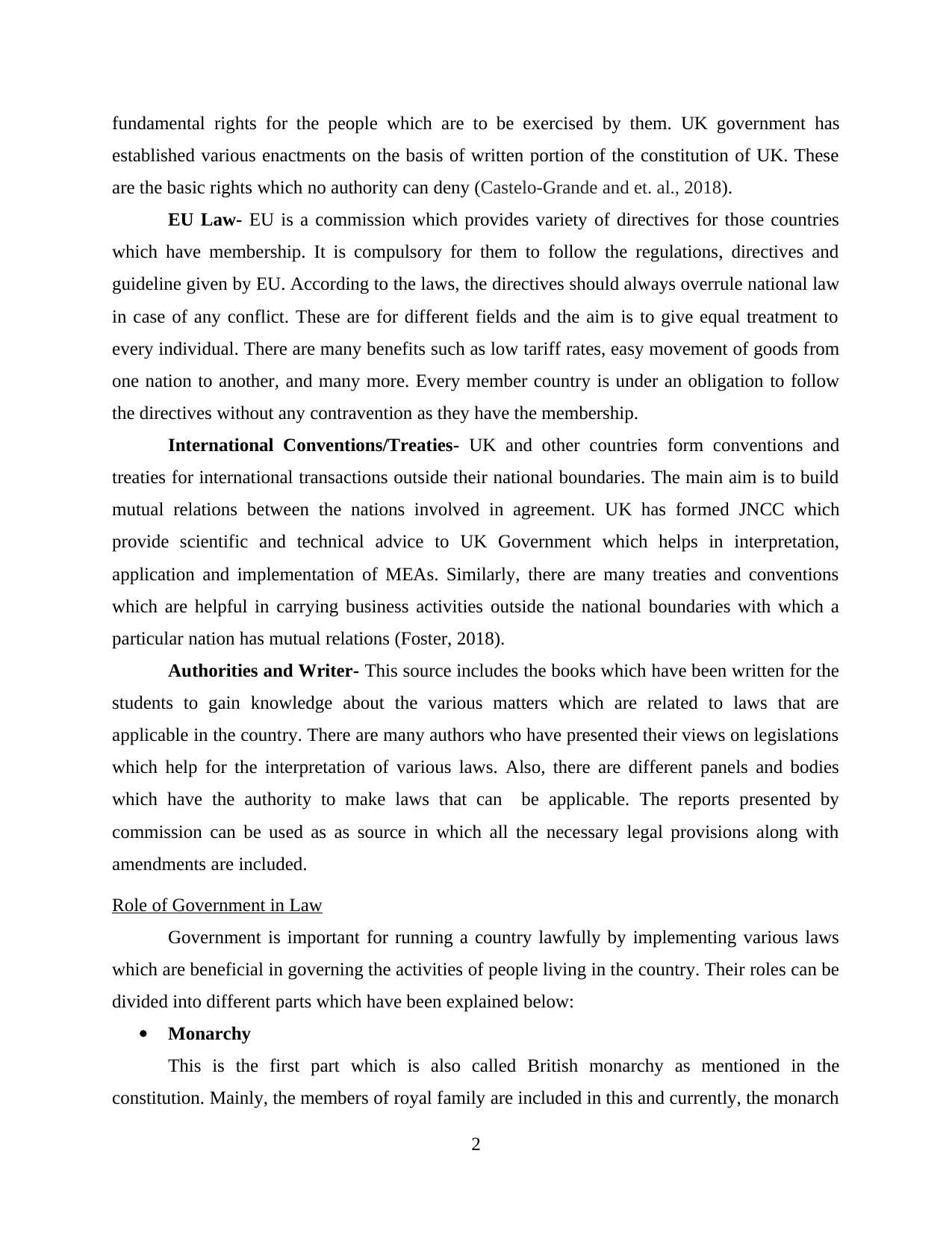
fundamental rights for the people which are to be exercised by them. UK government has
established various enactments on the basis of written portion of the constitution of UK. These
are the basic rights which no authority can deny (Castelo-Grande and et. al., 2018).
EU Law- EU is a commission which provides variety of directives for those countries
which have membership. It is compulsory for them to follow the regulations, directives and
guideline given by EU. According to the laws, the directives should always overrule national law
in case of any conflict. These are for different fields and the aim is to give equal treatment to
every individual. There are many benefits such as low tariff rates, easy movement of goods from
one nation to another, and many more. Every member country is under an obligation to follow
the directives without any contravention as they have the membership.
International Conventions/Treaties- UK and other countries form conventions and
treaties for international transactions outside their national boundaries. The main aim is to build
mutual relations between the nations involved in agreement. UK has formed JNCC which
provide scientific and technical advice to UK Government which helps in interpretation,
application and implementation of MEAs. Similarly, there are many treaties and conventions
which are helpful in carrying business activities outside the national boundaries with which a
particular nation has mutual relations (Foster, 2018).
Authorities and Writer- This source includes the books which have been written for the
students to gain knowledge about the various matters which are related to laws that are
applicable in the country. There are many authors who have presented their views on legislations
which help for the interpretation of various laws. Also, there are different panels and bodies
which have the authority to make laws that can be applicable. The reports presented by
commission can be used as as source in which all the necessary legal provisions along with
amendments are included.
Role of Government in Law
Government is important for running a country lawfully by implementing various laws
which are beneficial in governing the activities of people living in the country. Their roles can be
divided into different parts which have been explained below:
Monarchy
This is the first part which is also called British monarchy as mentioned in the
constitution. Mainly, the members of royal family are included in this and currently, the monarch
2
established various enactments on the basis of written portion of the constitution of UK. These
are the basic rights which no authority can deny (Castelo-Grande and et. al., 2018).
EU Law- EU is a commission which provides variety of directives for those countries
which have membership. It is compulsory for them to follow the regulations, directives and
guideline given by EU. According to the laws, the directives should always overrule national law
in case of any conflict. These are for different fields and the aim is to give equal treatment to
every individual. There are many benefits such as low tariff rates, easy movement of goods from
one nation to another, and many more. Every member country is under an obligation to follow
the directives without any contravention as they have the membership.
International Conventions/Treaties- UK and other countries form conventions and
treaties for international transactions outside their national boundaries. The main aim is to build
mutual relations between the nations involved in agreement. UK has formed JNCC which
provide scientific and technical advice to UK Government which helps in interpretation,
application and implementation of MEAs. Similarly, there are many treaties and conventions
which are helpful in carrying business activities outside the national boundaries with which a
particular nation has mutual relations (Foster, 2018).
Authorities and Writer- This source includes the books which have been written for the
students to gain knowledge about the various matters which are related to laws that are
applicable in the country. There are many authors who have presented their views on legislations
which help for the interpretation of various laws. Also, there are different panels and bodies
which have the authority to make laws that can be applicable. The reports presented by
commission can be used as as source in which all the necessary legal provisions along with
amendments are included.
Role of Government in Law
Government is important for running a country lawfully by implementing various laws
which are beneficial in governing the activities of people living in the country. Their roles can be
divided into different parts which have been explained below:
Monarchy
This is the first part which is also called British monarchy as mentioned in the
constitution. Mainly, the members of royal family are included in this and currently, the monarch
2
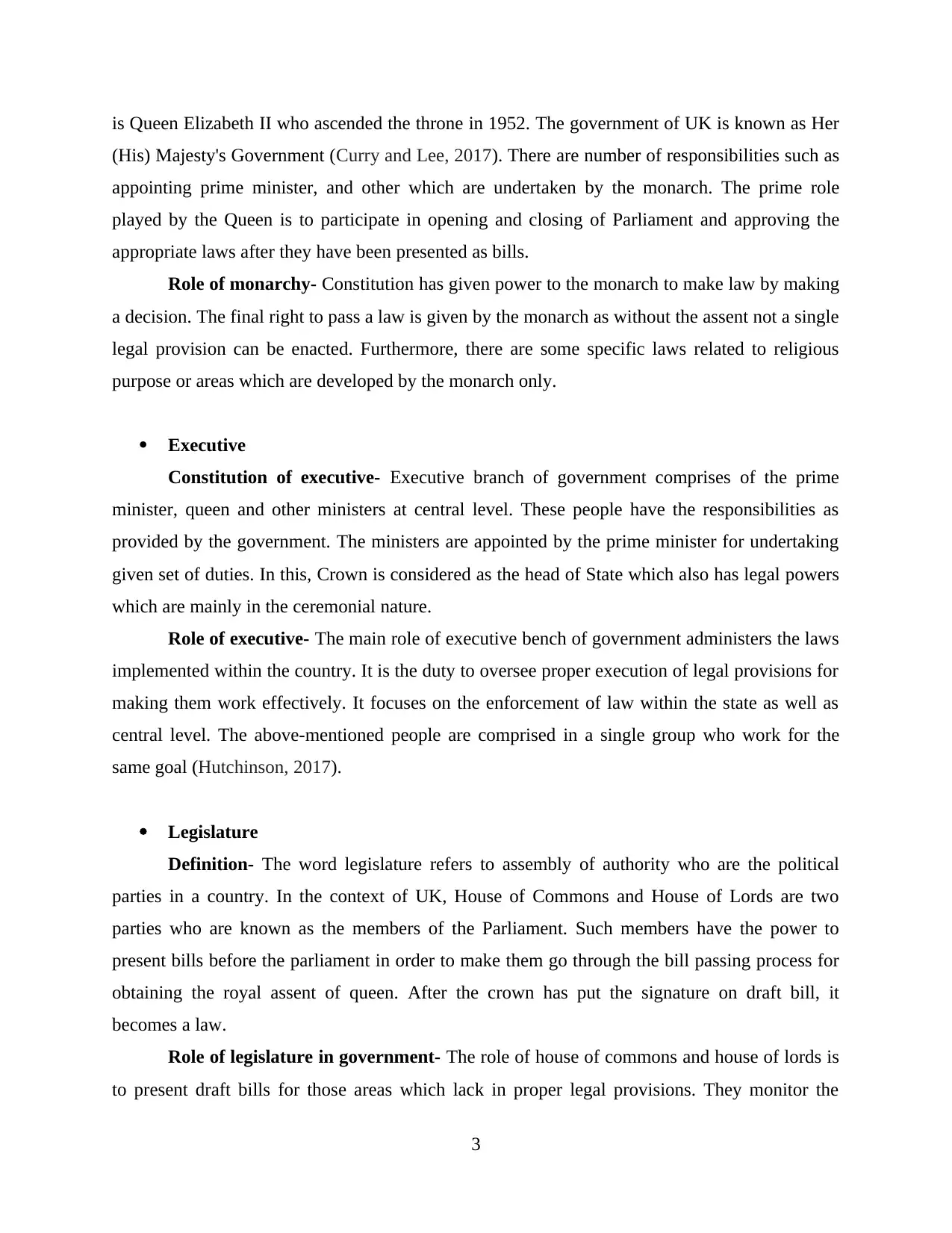
is Queen Elizabeth II who ascended the throne in 1952. The government of UK is known as Her
(His) Majesty's Government (Curry and Lee, 2017). There are number of responsibilities such as
appointing prime minister, and other which are undertaken by the monarch. The prime role
played by the Queen is to participate in opening and closing of Parliament and approving the
appropriate laws after they have been presented as bills.
Role of monarchy- Constitution has given power to the monarch to make law by making
a decision. The final right to pass a law is given by the monarch as without the assent not a single
legal provision can be enacted. Furthermore, there are some specific laws related to religious
purpose or areas which are developed by the monarch only.
Executive
Constitution of executive- Executive branch of government comprises of the prime
minister, queen and other ministers at central level. These people have the responsibilities as
provided by the government. The ministers are appointed by the prime minister for undertaking
given set of duties. In this, Crown is considered as the head of State which also has legal powers
which are mainly in the ceremonial nature.
Role of executive- The main role of executive bench of government administers the laws
implemented within the country. It is the duty to oversee proper execution of legal provisions for
making them work effectively. It focuses on the enforcement of law within the state as well as
central level. The above-mentioned people are comprised in a single group who work for the
same goal (Hutchinson, 2017).
Legislature
Definition- The word legislature refers to assembly of authority who are the political
parties in a country. In the context of UK, House of Commons and House of Lords are two
parties who are known as the members of the Parliament. Such members have the power to
present bills before the parliament in order to make them go through the bill passing process for
obtaining the royal assent of queen. After the crown has put the signature on draft bill, it
becomes a law.
Role of legislature in government- The role of house of commons and house of lords is
to present draft bills for those areas which lack in proper legal provisions. They monitor the
3
(His) Majesty's Government (Curry and Lee, 2017). There are number of responsibilities such as
appointing prime minister, and other which are undertaken by the monarch. The prime role
played by the Queen is to participate in opening and closing of Parliament and approving the
appropriate laws after they have been presented as bills.
Role of monarchy- Constitution has given power to the monarch to make law by making
a decision. The final right to pass a law is given by the monarch as without the assent not a single
legal provision can be enacted. Furthermore, there are some specific laws related to religious
purpose or areas which are developed by the monarch only.
Executive
Constitution of executive- Executive branch of government comprises of the prime
minister, queen and other ministers at central level. These people have the responsibilities as
provided by the government. The ministers are appointed by the prime minister for undertaking
given set of duties. In this, Crown is considered as the head of State which also has legal powers
which are mainly in the ceremonial nature.
Role of executive- The main role of executive bench of government administers the laws
implemented within the country. It is the duty to oversee proper execution of legal provisions for
making them work effectively. It focuses on the enforcement of law within the state as well as
central level. The above-mentioned people are comprised in a single group who work for the
same goal (Hutchinson, 2017).
Legislature
Definition- The word legislature refers to assembly of authority who are the political
parties in a country. In the context of UK, House of Commons and House of Lords are two
parties who are known as the members of the Parliament. Such members have the power to
present bills before the parliament in order to make them go through the bill passing process for
obtaining the royal assent of queen. After the crown has put the signature on draft bill, it
becomes a law.
Role of legislature in government- The role of house of commons and house of lords is
to present draft bills for those areas which lack in proper legal provisions. They monitor the
3
⊘ This is a preview!⊘
Do you want full access?
Subscribe today to unlock all pages.

Trusted by 1+ million students worldwide
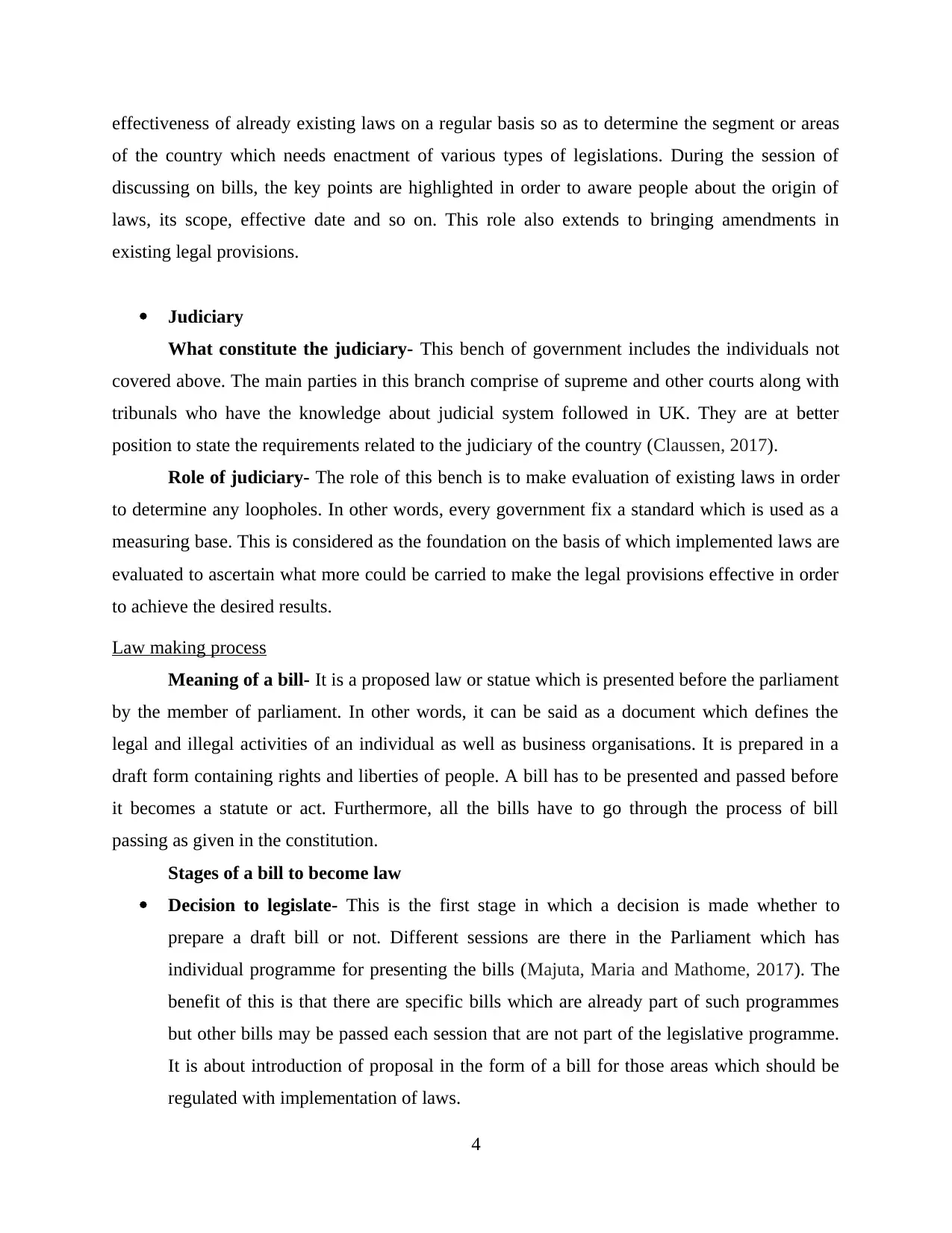
effectiveness of already existing laws on a regular basis so as to determine the segment or areas
of the country which needs enactment of various types of legislations. During the session of
discussing on bills, the key points are highlighted in order to aware people about the origin of
laws, its scope, effective date and so on. This role also extends to bringing amendments in
existing legal provisions.
Judiciary
What constitute the judiciary- This bench of government includes the individuals not
covered above. The main parties in this branch comprise of supreme and other courts along with
tribunals who have the knowledge about judicial system followed in UK. They are at better
position to state the requirements related to the judiciary of the country (Claussen, 2017).
Role of judiciary- The role of this bench is to make evaluation of existing laws in order
to determine any loopholes. In other words, every government fix a standard which is used as a
measuring base. This is considered as the foundation on the basis of which implemented laws are
evaluated to ascertain what more could be carried to make the legal provisions effective in order
to achieve the desired results.
Law making process
Meaning of a bill- It is a proposed law or statue which is presented before the parliament
by the member of parliament. In other words, it can be said as a document which defines the
legal and illegal activities of an individual as well as business organisations. It is prepared in a
draft form containing rights and liberties of people. A bill has to be presented and passed before
it becomes a statute or act. Furthermore, all the bills have to go through the process of bill
passing as given in the constitution.
Stages of a bill to become law
Decision to legislate- This is the first stage in which a decision is made whether to
prepare a draft bill or not. Different sessions are there in the Parliament which has
individual programme for presenting the bills (Majuta, Maria and Mathome, 2017). The
benefit of this is that there are specific bills which are already part of such programmes
but other bills may be passed each session that are not part of the legislative programme.
It is about introduction of proposal in the form of a bill for those areas which should be
regulated with implementation of laws.
4
of the country which needs enactment of various types of legislations. During the session of
discussing on bills, the key points are highlighted in order to aware people about the origin of
laws, its scope, effective date and so on. This role also extends to bringing amendments in
existing legal provisions.
Judiciary
What constitute the judiciary- This bench of government includes the individuals not
covered above. The main parties in this branch comprise of supreme and other courts along with
tribunals who have the knowledge about judicial system followed in UK. They are at better
position to state the requirements related to the judiciary of the country (Claussen, 2017).
Role of judiciary- The role of this bench is to make evaluation of existing laws in order
to determine any loopholes. In other words, every government fix a standard which is used as a
measuring base. This is considered as the foundation on the basis of which implemented laws are
evaluated to ascertain what more could be carried to make the legal provisions effective in order
to achieve the desired results.
Law making process
Meaning of a bill- It is a proposed law or statue which is presented before the parliament
by the member of parliament. In other words, it can be said as a document which defines the
legal and illegal activities of an individual as well as business organisations. It is prepared in a
draft form containing rights and liberties of people. A bill has to be presented and passed before
it becomes a statute or act. Furthermore, all the bills have to go through the process of bill
passing as given in the constitution.
Stages of a bill to become law
Decision to legislate- This is the first stage in which a decision is made whether to
prepare a draft bill or not. Different sessions are there in the Parliament which has
individual programme for presenting the bills (Majuta, Maria and Mathome, 2017). The
benefit of this is that there are specific bills which are already part of such programmes
but other bills may be passed each session that are not part of the legislative programme.
It is about introduction of proposal in the form of a bill for those areas which should be
regulated with implementation of laws.
4
Paraphrase This Document
Need a fresh take? Get an instant paraphrase of this document with our AI Paraphraser
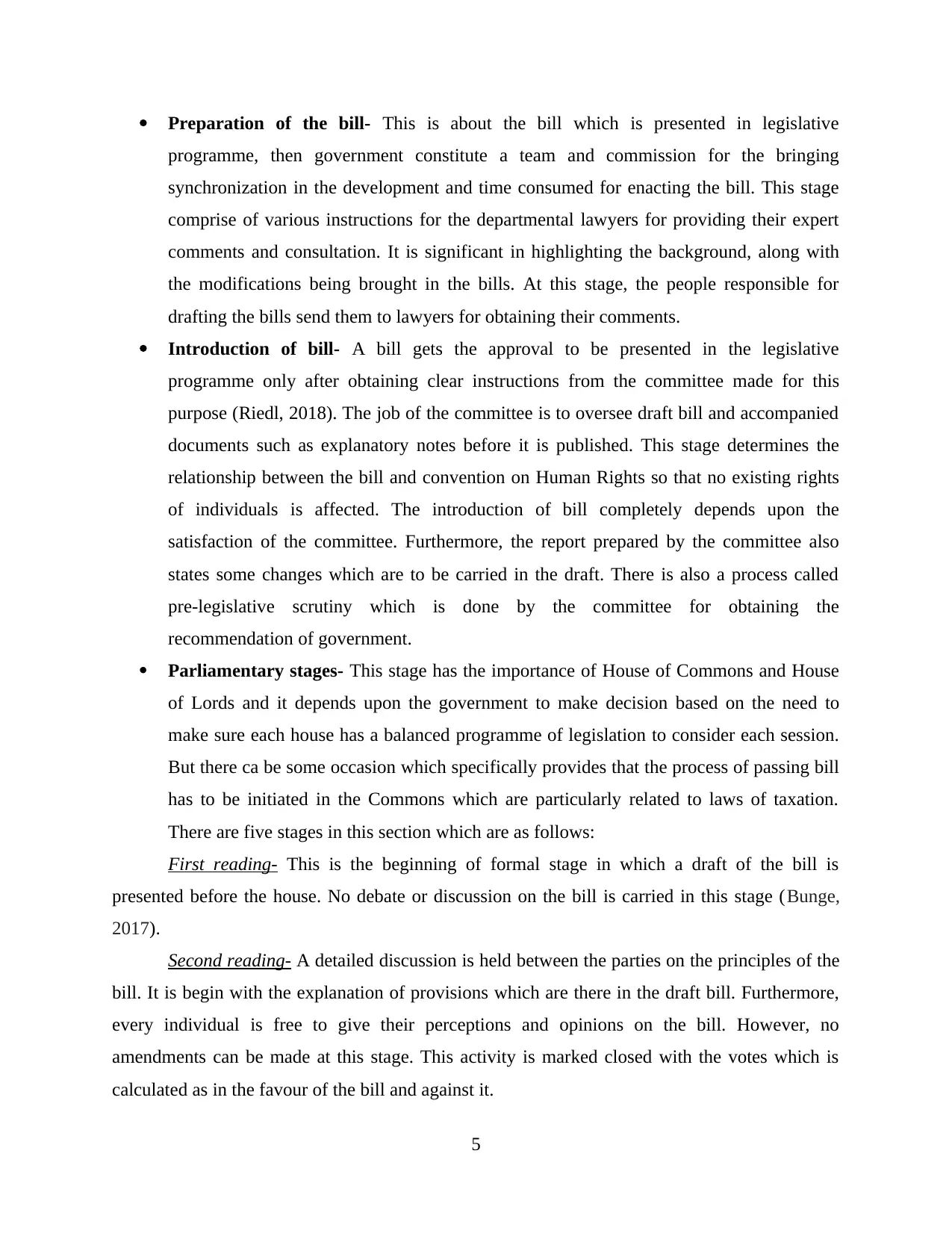
Preparation of the bill- This is about the bill which is presented in legislative
programme, then government constitute a team and commission for the bringing
synchronization in the development and time consumed for enacting the bill. This stage
comprise of various instructions for the departmental lawyers for providing their expert
comments and consultation. It is significant in highlighting the background, along with
the modifications being brought in the bills. At this stage, the people responsible for
drafting the bills send them to lawyers for obtaining their comments.
Introduction of bill- A bill gets the approval to be presented in the legislative
programme only after obtaining clear instructions from the committee made for this
purpose (Riedl, 2018). The job of the committee is to oversee draft bill and accompanied
documents such as explanatory notes before it is published. This stage determines the
relationship between the bill and convention on Human Rights so that no existing rights
of individuals is affected. The introduction of bill completely depends upon the
satisfaction of the committee. Furthermore, the report prepared by the committee also
states some changes which are to be carried in the draft. There is also a process called
pre-legislative scrutiny which is done by the committee for obtaining the
recommendation of government.
Parliamentary stages- This stage has the importance of House of Commons and House
of Lords and it depends upon the government to make decision based on the need to
make sure each house has a balanced programme of legislation to consider each session.
But there ca be some occasion which specifically provides that the process of passing bill
has to be initiated in the Commons which are particularly related to laws of taxation.
There are five stages in this section which are as follows:
First reading- This is the beginning of formal stage in which a draft of the bill is
presented before the house. No debate or discussion on the bill is carried in this stage (Bunge,
2017).
Second reading- A detailed discussion is held between the parties on the principles of the
bill. It is begin with the explanation of provisions which are there in the draft bill. Furthermore,
every individual is free to give their perceptions and opinions on the bill. However, no
amendments can be made at this stage. This activity is marked closed with the votes which is
calculated as in the favour of the bill and against it.
5
programme, then government constitute a team and commission for the bringing
synchronization in the development and time consumed for enacting the bill. This stage
comprise of various instructions for the departmental lawyers for providing their expert
comments and consultation. It is significant in highlighting the background, along with
the modifications being brought in the bills. At this stage, the people responsible for
drafting the bills send them to lawyers for obtaining their comments.
Introduction of bill- A bill gets the approval to be presented in the legislative
programme only after obtaining clear instructions from the committee made for this
purpose (Riedl, 2018). The job of the committee is to oversee draft bill and accompanied
documents such as explanatory notes before it is published. This stage determines the
relationship between the bill and convention on Human Rights so that no existing rights
of individuals is affected. The introduction of bill completely depends upon the
satisfaction of the committee. Furthermore, the report prepared by the committee also
states some changes which are to be carried in the draft. There is also a process called
pre-legislative scrutiny which is done by the committee for obtaining the
recommendation of government.
Parliamentary stages- This stage has the importance of House of Commons and House
of Lords and it depends upon the government to make decision based on the need to
make sure each house has a balanced programme of legislation to consider each session.
But there ca be some occasion which specifically provides that the process of passing bill
has to be initiated in the Commons which are particularly related to laws of taxation.
There are five stages in this section which are as follows:
First reading- This is the beginning of formal stage in which a draft of the bill is
presented before the house. No debate or discussion on the bill is carried in this stage (Bunge,
2017).
Second reading- A detailed discussion is held between the parties on the principles of the
bill. It is begin with the explanation of provisions which are there in the draft bill. Furthermore,
every individual is free to give their perceptions and opinions on the bill. However, no
amendments can be made at this stage. This activity is marked closed with the votes which is
calculated as in the favour of the bill and against it.
5
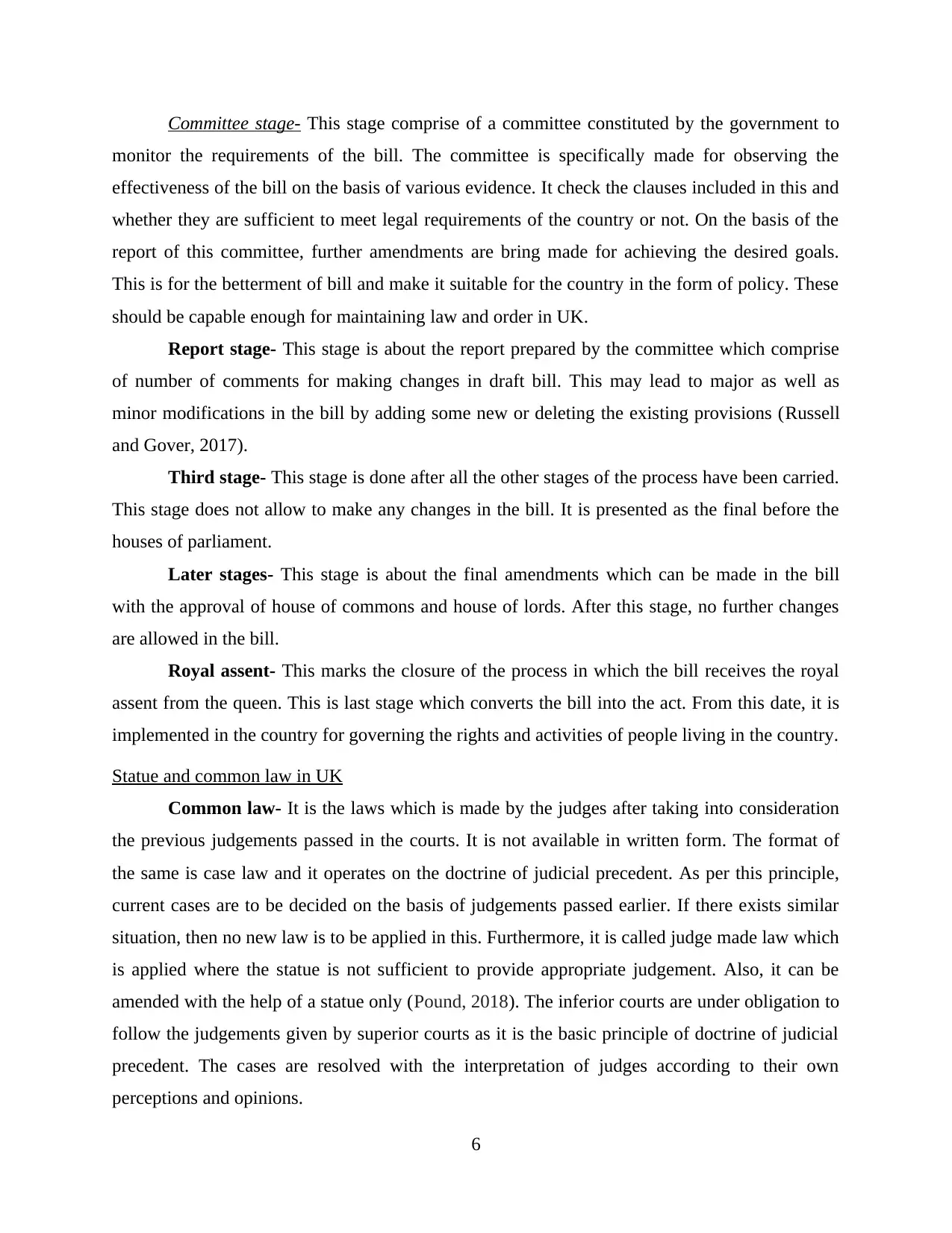
Committee stage- This stage comprise of a committee constituted by the government to
monitor the requirements of the bill. The committee is specifically made for observing the
effectiveness of the bill on the basis of various evidence. It check the clauses included in this and
whether they are sufficient to meet legal requirements of the country or not. On the basis of the
report of this committee, further amendments are bring made for achieving the desired goals.
This is for the betterment of bill and make it suitable for the country in the form of policy. These
should be capable enough for maintaining law and order in UK.
Report stage- This stage is about the report prepared by the committee which comprise
of number of comments for making changes in draft bill. This may lead to major as well as
minor modifications in the bill by adding some new or deleting the existing provisions (Russell
and Gover, 2017).
Third stage- This stage is done after all the other stages of the process have been carried.
This stage does not allow to make any changes in the bill. It is presented as the final before the
houses of parliament.
Later stages- This stage is about the final amendments which can be made in the bill
with the approval of house of commons and house of lords. After this stage, no further changes
are allowed in the bill.
Royal assent- This marks the closure of the process in which the bill receives the royal
assent from the queen. This is last stage which converts the bill into the act. From this date, it is
implemented in the country for governing the rights and activities of people living in the country.
Statue and common law in UK
Common law- It is the laws which is made by the judges after taking into consideration
the previous judgements passed in the courts. It is not available in written form. The format of
the same is case law and it operates on the doctrine of judicial precedent. As per this principle,
current cases are to be decided on the basis of judgements passed earlier. If there exists similar
situation, then no new law is to be applied in this. Furthermore, it is called judge made law which
is applied where the statue is not sufficient to provide appropriate judgement. Also, it can be
amended with the help of a statue only (Pound, 2018). The inferior courts are under obligation to
follow the judgements given by superior courts as it is the basic principle of doctrine of judicial
precedent. The cases are resolved with the interpretation of judges according to their own
perceptions and opinions.
6
monitor the requirements of the bill. The committee is specifically made for observing the
effectiveness of the bill on the basis of various evidence. It check the clauses included in this and
whether they are sufficient to meet legal requirements of the country or not. On the basis of the
report of this committee, further amendments are bring made for achieving the desired goals.
This is for the betterment of bill and make it suitable for the country in the form of policy. These
should be capable enough for maintaining law and order in UK.
Report stage- This stage is about the report prepared by the committee which comprise
of number of comments for making changes in draft bill. This may lead to major as well as
minor modifications in the bill by adding some new or deleting the existing provisions (Russell
and Gover, 2017).
Third stage- This stage is done after all the other stages of the process have been carried.
This stage does not allow to make any changes in the bill. It is presented as the final before the
houses of parliament.
Later stages- This stage is about the final amendments which can be made in the bill
with the approval of house of commons and house of lords. After this stage, no further changes
are allowed in the bill.
Royal assent- This marks the closure of the process in which the bill receives the royal
assent from the queen. This is last stage which converts the bill into the act. From this date, it is
implemented in the country for governing the rights and activities of people living in the country.
Statue and common law in UK
Common law- It is the laws which is made by the judges after taking into consideration
the previous judgements passed in the courts. It is not available in written form. The format of
the same is case law and it operates on the doctrine of judicial precedent. As per this principle,
current cases are to be decided on the basis of judgements passed earlier. If there exists similar
situation, then no new law is to be applied in this. Furthermore, it is called judge made law which
is applied where the statue is not sufficient to provide appropriate judgement. Also, it can be
amended with the help of a statue only (Pound, 2018). The inferior courts are under obligation to
follow the judgements given by superior courts as it is the basic principle of doctrine of judicial
precedent. The cases are resolved with the interpretation of judges according to their own
perceptions and opinions.
6
⊘ This is a preview!⊘
Do you want full access?
Subscribe today to unlock all pages.

Trusted by 1+ million students worldwide
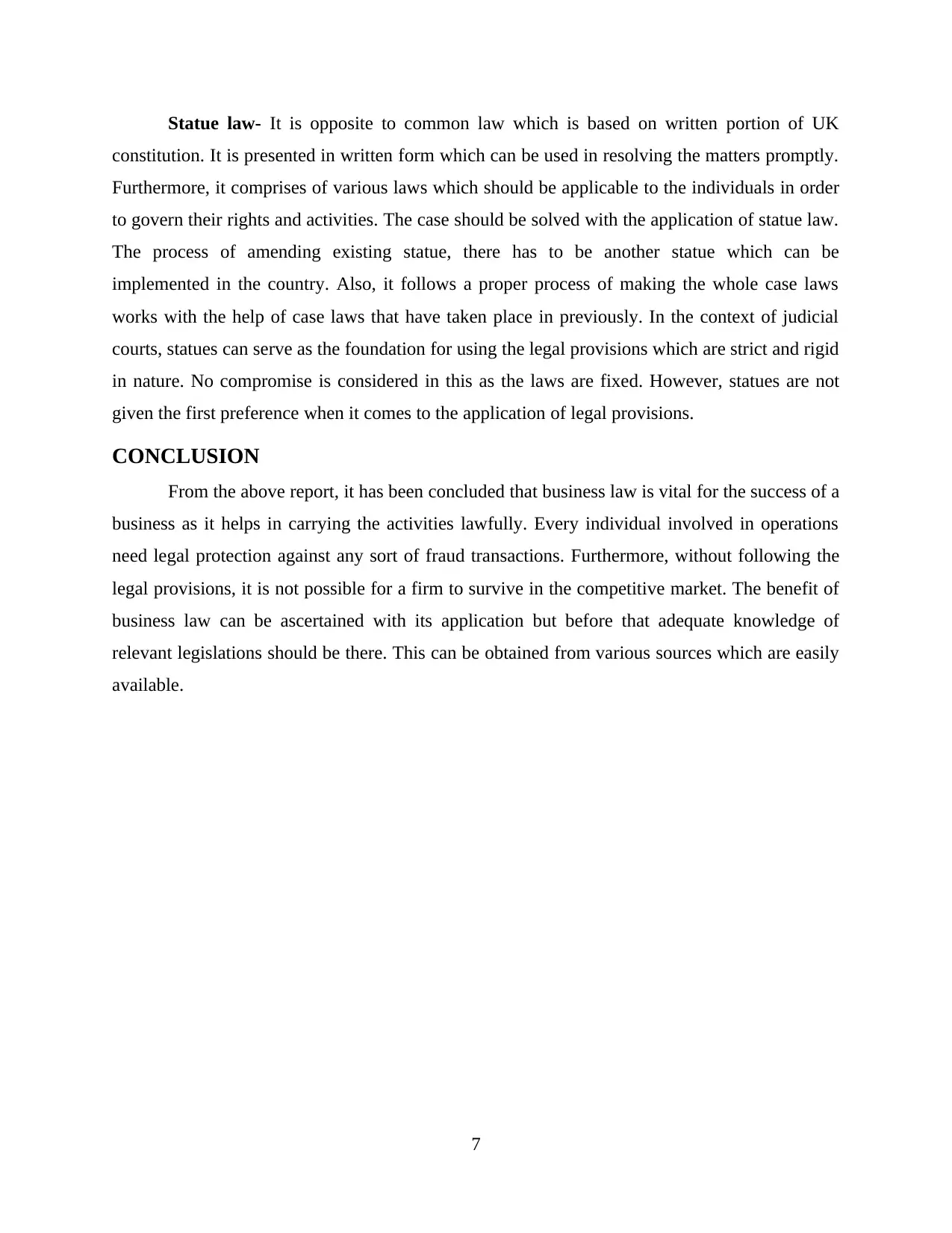
Statue law- It is opposite to common law which is based on written portion of UK
constitution. It is presented in written form which can be used in resolving the matters promptly.
Furthermore, it comprises of various laws which should be applicable to the individuals in order
to govern their rights and activities. The case should be solved with the application of statue law.
The process of amending existing statue, there has to be another statue which can be
implemented in the country. Also, it follows a proper process of making the whole case laws
works with the help of case laws that have taken place in previously. In the context of judicial
courts, statues can serve as the foundation for using the legal provisions which are strict and rigid
in nature. No compromise is considered in this as the laws are fixed. However, statues are not
given the first preference when it comes to the application of legal provisions.
CONCLUSION
From the above report, it has been concluded that business law is vital for the success of a
business as it helps in carrying the activities lawfully. Every individual involved in operations
need legal protection against any sort of fraud transactions. Furthermore, without following the
legal provisions, it is not possible for a firm to survive in the competitive market. The benefit of
business law can be ascertained with its application but before that adequate knowledge of
relevant legislations should be there. This can be obtained from various sources which are easily
available.
7
constitution. It is presented in written form which can be used in resolving the matters promptly.
Furthermore, it comprises of various laws which should be applicable to the individuals in order
to govern their rights and activities. The case should be solved with the application of statue law.
The process of amending existing statue, there has to be another statue which can be
implemented in the country. Also, it follows a proper process of making the whole case laws
works with the help of case laws that have taken place in previously. In the context of judicial
courts, statues can serve as the foundation for using the legal provisions which are strict and rigid
in nature. No compromise is considered in this as the laws are fixed. However, statues are not
given the first preference when it comes to the application of legal provisions.
CONCLUSION
From the above report, it has been concluded that business law is vital for the success of a
business as it helps in carrying the activities lawfully. Every individual involved in operations
need legal protection against any sort of fraud transactions. Furthermore, without following the
legal provisions, it is not possible for a firm to survive in the competitive market. The benefit of
business law can be ascertained with its application but before that adequate knowledge of
relevant legislations should be there. This can be obtained from various sources which are easily
available.
7
Paraphrase This Document
Need a fresh take? Get an instant paraphrase of this document with our AI Paraphraser
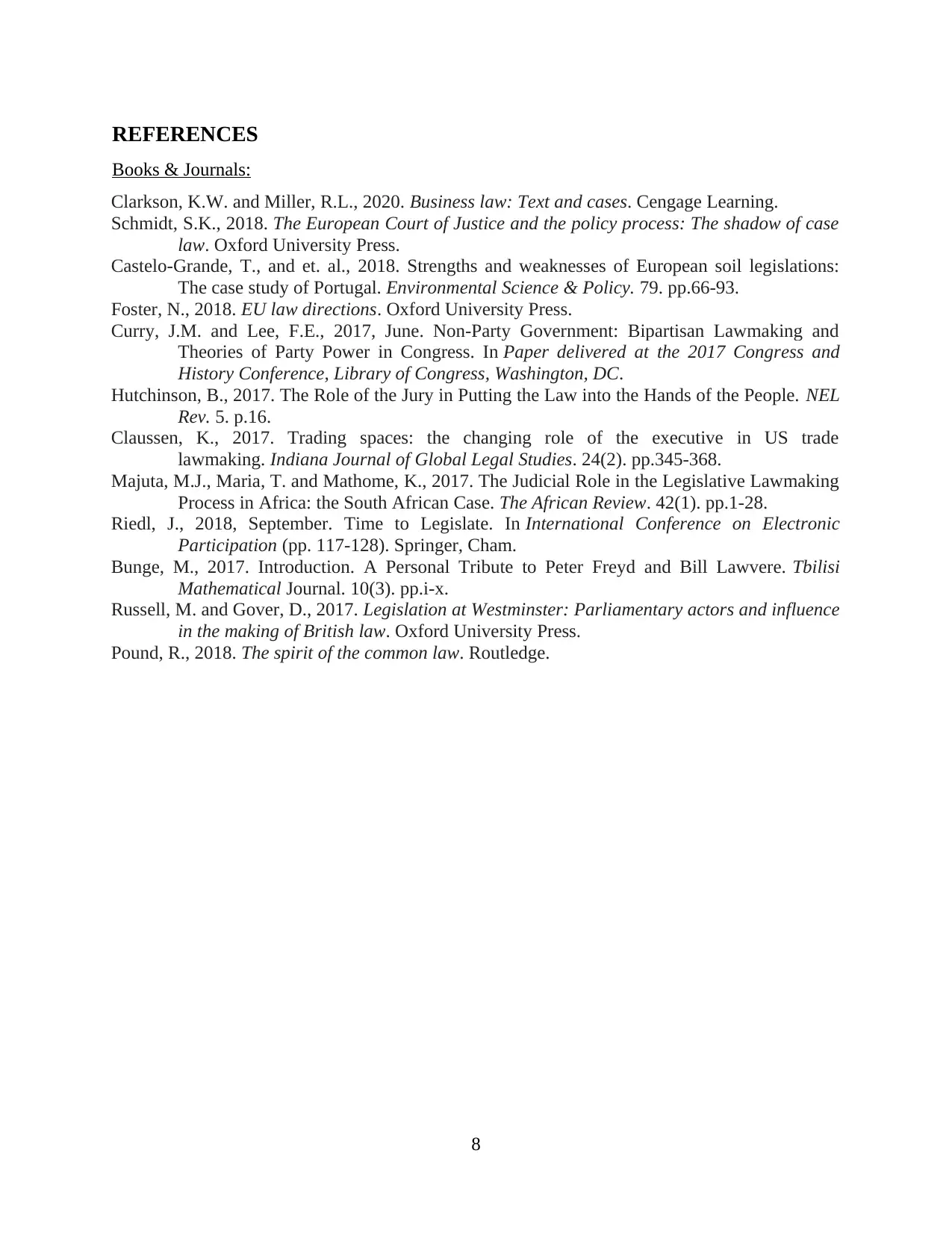
REFERENCES
Books & Journals:
Clarkson, K.W. and Miller, R.L., 2020. Business law: Text and cases. Cengage Learning.
Schmidt, S.K., 2018. The European Court of Justice and the policy process: The shadow of case
law. Oxford University Press.
Castelo-Grande, T., and et. al., 2018. Strengths and weaknesses of European soil legislations:
The case study of Portugal. Environmental Science & Policy. 79. pp.66-93.
Foster, N., 2018. EU law directions. Oxford University Press.
Curry, J.M. and Lee, F.E., 2017, June. Non-Party Government: Bipartisan Lawmaking and
Theories of Party Power in Congress. In Paper delivered at the 2017 Congress and
History Conference, Library of Congress, Washington, DC.
Hutchinson, B., 2017. The Role of the Jury in Putting the Law into the Hands of the People. NEL
Rev. 5. p.16.
Claussen, K., 2017. Trading spaces: the changing role of the executive in US trade
lawmaking. Indiana Journal of Global Legal Studies. 24(2). pp.345-368.
Majuta, M.J., Maria, T. and Mathome, K., 2017. The Judicial Role in the Legislative Lawmaking
Process in Africa: the South African Case. The African Review. 42(1). pp.1-28.
Riedl, J., 2018, September. Time to Legislate. In International Conference on Electronic
Participation (pp. 117-128). Springer, Cham.
Bunge, M., 2017. Introduction. A Personal Tribute to Peter Freyd and Bill Lawvere. Tbilisi
Mathematical Journal. 10(3). pp.i-x.
Russell, M. and Gover, D., 2017. Legislation at Westminster: Parliamentary actors and influence
in the making of British law. Oxford University Press.
Pound, R., 2018. The spirit of the common law. Routledge.
8
Books & Journals:
Clarkson, K.W. and Miller, R.L., 2020. Business law: Text and cases. Cengage Learning.
Schmidt, S.K., 2018. The European Court of Justice and the policy process: The shadow of case
law. Oxford University Press.
Castelo-Grande, T., and et. al., 2018. Strengths and weaknesses of European soil legislations:
The case study of Portugal. Environmental Science & Policy. 79. pp.66-93.
Foster, N., 2018. EU law directions. Oxford University Press.
Curry, J.M. and Lee, F.E., 2017, June. Non-Party Government: Bipartisan Lawmaking and
Theories of Party Power in Congress. In Paper delivered at the 2017 Congress and
History Conference, Library of Congress, Washington, DC.
Hutchinson, B., 2017. The Role of the Jury in Putting the Law into the Hands of the People. NEL
Rev. 5. p.16.
Claussen, K., 2017. Trading spaces: the changing role of the executive in US trade
lawmaking. Indiana Journal of Global Legal Studies. 24(2). pp.345-368.
Majuta, M.J., Maria, T. and Mathome, K., 2017. The Judicial Role in the Legislative Lawmaking
Process in Africa: the South African Case. The African Review. 42(1). pp.1-28.
Riedl, J., 2018, September. Time to Legislate. In International Conference on Electronic
Participation (pp. 117-128). Springer, Cham.
Bunge, M., 2017. Introduction. A Personal Tribute to Peter Freyd and Bill Lawvere. Tbilisi
Mathematical Journal. 10(3). pp.i-x.
Russell, M. and Gover, D., 2017. Legislation at Westminster: Parliamentary actors and influence
in the making of British law. Oxford University Press.
Pound, R., 2018. The spirit of the common law. Routledge.
8

9
⊘ This is a preview!⊘
Do you want full access?
Subscribe today to unlock all pages.

Trusted by 1+ million students worldwide
1 out of 12
Related Documents
Your All-in-One AI-Powered Toolkit for Academic Success.
+13062052269
info@desklib.com
Available 24*7 on WhatsApp / Email
![[object Object]](/_next/static/media/star-bottom.7253800d.svg)
Unlock your academic potential
Copyright © 2020–2026 A2Z Services. All Rights Reserved. Developed and managed by ZUCOL.





